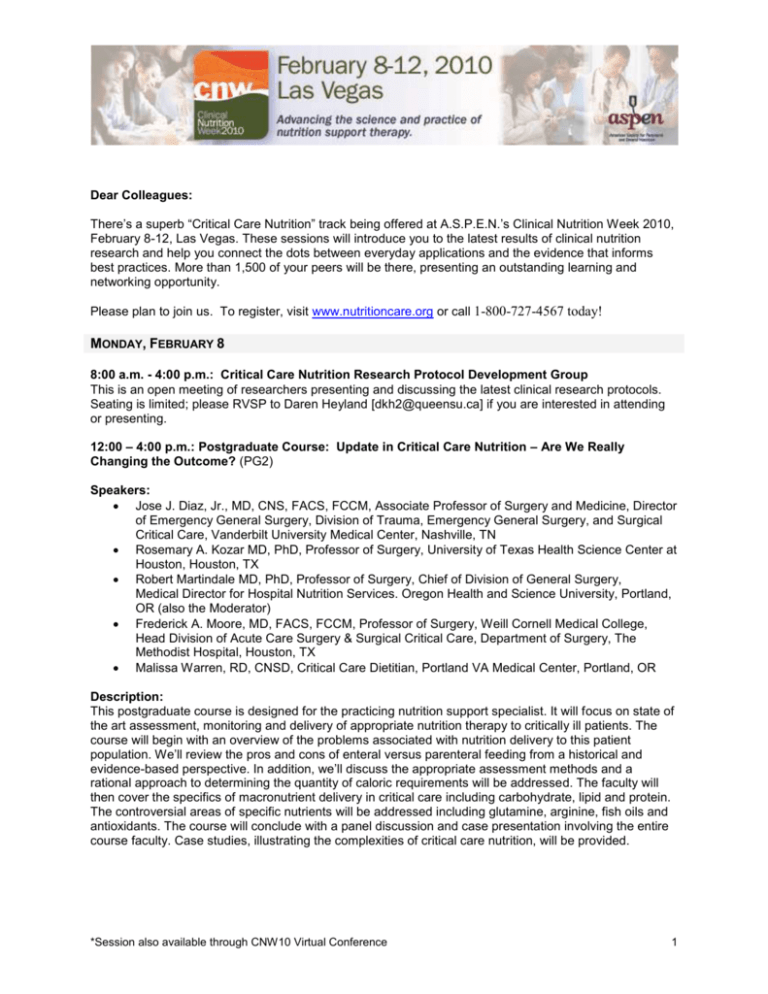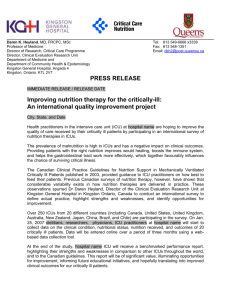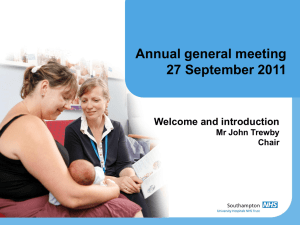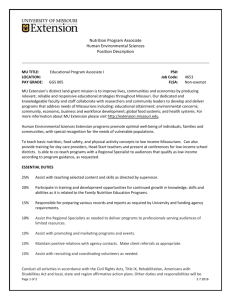CriticalCareSessionsCNW2010
advertisement

Dear Colleagues: There’s a superb “Critical Care Nutrition” track being offered at A.S.P.E.N.’s Clinical Nutrition Week 2010, February 8-12, Las Vegas. These sessions will introduce you to the latest results of clinical nutrition research and help you connect the dots between everyday applications and the evidence that informs best practices. More than 1,500 of your peers will be there, presenting an outstanding learning and networking opportunity. Please plan to join us. To register, visit www.nutritioncare.org or call 1-800-727-4567 today! MONDAY, FEBRUARY 8 8:00 a.m. - 4:00 p.m.: Critical Care Nutrition Research Protocol Development Group This is an open meeting of researchers presenting and discussing the latest clinical research protocols. Seating is limited; please RVSP to Daren Heyland [dkh2@queensu.ca] if you are interested in attending or presenting. 12:00 – 4:00 p.m.: Postgraduate Course: Update in Critical Care Nutrition – Are We Really Changing the Outcome? (PG2) Speakers: Jose J. Diaz, Jr., MD, CNS, FACS, FCCM, Associate Professor of Surgery and Medicine, Director of Emergency General Surgery, Division of Trauma, Emergency General Surgery, and Surgical Critical Care, Vanderbilt University Medical Center, Nashville, TN Rosemary A. Kozar MD, PhD, Professor of Surgery, University of Texas Health Science Center at Houston, Houston, TX Robert Martindale MD, PhD, Professor of Surgery, Chief of Division of General Surgery, Medical Director for Hospital Nutrition Services. Oregon Health and Science University, Portland, OR (also the Moderator) Frederick A. Moore, MD, FACS, FCCM, Professor of Surgery, Weill Cornell Medical College, Head Division of Acute Care Surgery & Surgical Critical Care, Department of Surgery, The Methodist Hospital, Houston, TX Malissa Warren, RD, CNSD, Critical Care Dietitian, Portland VA Medical Center, Portland, OR Description: This postgraduate course is designed for the practicing nutrition support specialist. It will focus on state of the art assessment, monitoring and delivery of appropriate nutrition therapy to critically ill patients. The course will begin with an overview of the problems associated with nutrition delivery to this patient population. We’ll review the pros and cons of enteral versus parenteral feeding from a historical and evidence-based perspective. In addition, we’ll discuss the appropriate assessment methods and a rational approach to determining the quantity of caloric requirements will be addressed. The faculty will then cover the specifics of macronutrient delivery in critical care including carbohydrate, lipid and protein. The controversial areas of specific nutrients will be addressed including glutamine, arginine, fish oils and antioxidants. The course will conclude with a panel discussion and case presentation involving the entire course faculty. Case studies, illustrating the complexities of critical care nutrition, will be provided. *Session also available through CNW10 Virtual Conference 1 Topics: Critical Care Nutrition: An Overview of the Current State of the Art Nutrition Assessment and Caloric Requirements Macronutrients: When to Begin, Which One to Give and Why? Glutamine, Arginine and Fish Oils: Let the Controversy Begin Case Studies in Critical Care Nutrition: The Good, the Bad and the Ugly Objectives: Outline the appropriate nutrition assessment criteria and tests for the critically ill patient Develop knowledge of the criteria used to determine best feeding path for critically ill patients Evaluate current evidence related to macro and micronutrient to determine appropriate feeding formulas for critically ill patients Level: Intermediate/Advanced TUESDAY, FEBRUARY 9 10:30 a.m. – 12:00 p.m.: Optimizing the Role of Parenteral Nutrition in the Critical Care Setting (T24) A Pro/Con Debate: The use of early PN is warranted in critically ill patients with an intact GI tract. Pro: Jan Wernerman, MD, Professor of Intensive Care Medicine, Huddinge University Hospital, Department of Anesthesia, Intensive Care, Stockholm, Sweden Con: Daren Heyland, MD, Professor of Medicine, Queen’s University. Moderator: Paul Wischmeyer, MD, Associate Chairman for Clinical and Translational Research, Director of Medical Student Research, Director of Nutrition Therapy Services, Professor of Anesthesiology, Department of Anesthesia, University of Colorado, Aurora, CO Description: The use of parenteral nutrition in the critically ill patient with an intact GI tract is controversial, with few high-quality studies to provide guidance in patient management. This session will focus on defining the role for early supplemental parenteral nutrition and the role of IV glutamine in conjunction with parenteral nutrition. Faculty will conduct a pros and cons debate: The use of early parenteral nutrition is warranted in critically ill patients with an intact GI tract. Each debater will present their arguments in 15 minutes and have a two minute rebuttal, followed by questions from the audience. Speaker: Jan Wernerman, MD, Professor of Intensive Care Medicine, Huddinge University Hospital, Department of Anesthesia, Intensive Care, Stockholm, Sweden Title: Results of Scandinavian IV Glutamine Trial *Session also available through CNW10 Virtual Conference 2 1:30 – 3:00 p.m.: Pharmaconutrition in the ICU: Results of Recent Randomized Trials (T31) Speakers: Robert G. Martindale, MD, PhD, Professor of Surgery, Chief of Division of General Surgery, Medical Director, Hospital Nutrition Services, Oregon Health and Science University, Portland, OR Todd Rice, MD, MSc, Assistant Professor of Medicine, Division of Allergy, Pulmonary, and Critical Care Medicine, Vanderbilt University School of Medicine, Nashville, TN Renee Stapleton, MD, MSc, Assistant Professor, University of Vermont, Essex, VT Moderator: Daren Heyland, MD, Professor of Medicine and Epidemiology, Queen's University, Kingston General Hospital, Queen's University, Kingston, Ontario, Canada Description: Join a team of experts in nutrition support therapy from across the continent for a lively discussion on pharmaconutrition in the critical care setting. The use of specialized nutrients can modify the underlying disease process and improve the outcomes of critically ill patients. Pharmaconutrition formulas may provide exciting innovations for the nutrition therapy of the critically ill patient. This session will focus on the results of recent trials of omega 3 fatty acids, glutamine and antioxidants. Come and receive this new information firsthand. Level: Advanced UPN: 216-000-10-009-L04-P WEDNESDAY, FEBRUARY 10 8:00 – 10:00 a.m.: Lost in Translation: Clinical Practice Guidelines – Where Do We Go from Here? (W10) *vc Speakers: Charlene Compher, PhD, RD, FADA, CNSC, LDN, Associate Professor of Nutrition Science, Clinician Educator, University of Pennsylvania School of Nursing, Philadelphia, PA (also moderator) Alistair Forbes, BSc, MD, FRCP, FHEA, Professor of Gastroenterology & Clinical Nutrition, Department of Gastroenterology and Nutrition University College Hospital, London, United Kingdom Daren Heyland, MD, Professor of Medicine and Epidemiology, Queen's University, Director of Research, Critical Care Program and Director of End of Life Research Working Group, Kingston General Hospital, Queen's University, Kingston, Ontario, Canada Naomi Jones, RD, PhD (candidate), Project leader, Clinical Evaluation Research Unit, Kingston General Hospital, Kingston, Ontario, Canada Robert Martindale, MD, PhD, Professor of Surgery, Chief of Division of General Surgery, Medical Director Hospital Nutrition Services, Oregon Health and Science University, Portland, OR Paul Wischmeyer, MD, Associate-Chairman for Clinical and Translational Research; Director of Medical Student Research; Director of Nutrition Therapy Services, University of Colorado; Professor of Anesthesiology, Department of Anesthesia, Aurora, CO (moderator) Description: All major specialty societies produce clinical practice guidelines to aid practitioners in clinical decisions. These clinical practice guidelines, while beneficial to many practitioners, are often on the same topic and may have conflicting statements. How do we make sense of all of this? While this symposium will focus *Session also available through CNW10 Virtual Conference 3 on the various critical care nutrition guidelines currently available to nutrition support practitioners, you’ll also hear take home messages of how to appraise, interpret and utilize guidelines in other settings. Plus, you’ll be introduced to A.S.P.E.N.’s new system for grading evidence included in clinical practice guidelines. At the conclusion of this unopposed plenary session, the awards for the 2009 “Best of the Best” will be presented to the top 3 performing ICUs. Level: Intermediate UPN: 216-000-10-017-L04-P 10:30 a.m. – 12:30 p.m.: Glucose Control Adult and Pediatric Critical Care Patients (W20) *vc Speakers: Todd Canada, PharmD, BCNSP, FASHP, Clinical Pharmacy Services Manager and Clinical Specialist, MD Anderson Cancer Center, Houston, TX Daren K. Heyland, MD, Professor of Medicine and Epidemiology, Queen's University, Kingston General Hospital, Queen's University, Kingston, Ontario, Canada Nilesh Mehta, MD, Assistant Professor in Critical Care Medicine, Instructor in Anesthesia, Children’s Hospital Boston, Boston, MA Moderator: Carol Ireton-Jones, PhD, RD, LD, CNSD, FACN, Chief Operating Officer, Professional Nutrition Therapists, Dallas, TX Description: Glucose control is a common challenge in critical care patients. Newer data has shown that accurate control of glucose improves outcomes. However, the levels of glucose control remain variable in current literature. This program will provide evidence-based updates on glucose control for both pediatric and adult critical care patients, cover the latest clinical guidelines and provide you with tools to put this information into practice. Level: Advanced UPN: 216-000-10-018-L01-P 4:00 – 5:30 p.m.: Optimizing Enteral Nutrition in the ICU setting (W40) Speakers: Andrew Davies, Intensivist, Deputy Director of ICU, Alfred Hospital, Melbourne, Australia Daren Heyland, MD, Professor of Medicine and Epidemiology, Queen's University, Kingston General Hospital, Queen's University, Kingston, Ontario, Canada Renee Stapleton, MD, Assistant Professor, Division of Pulmonary and Critical Care, Department of Medicine, Fletcher Allen Health Care/University of Vermont, Burlington, VT Todd Rice, MD, Assistant Professor of Medicine, Division of Allergy, Pulmonary, and Critical Care Medicine, Vanderbilt University School of Medicine, Nashville, TN Moderator: John Drover, MD, Associate Professor, Department of Surgery, Queen's University, Kingston, Ontario, Canada *Session also available through CNW10 Virtual Conference 4 Description: Join critical care experts for a dynamic discussion of enteral nutrition in the ICU setting. The use of early enteral nutrition remains the mainstay of nutrition therapy for the average critically ill patient. This session will focus on the results of recent randomized trials that provide new evidence on the optimal provision of EN to critically ill patients. Level: Intermediate UPN: 216-000-10-027-L04-P 4:00-5:30 p.m.: Wednesday Roundtables Feeding the Trauma/Emergency Surgery Patient: Myth versus Reality Bryan Collier, DO, CNSP, FACS, Assistant Professor of Surgery, Department of Surgery, Division of Trauma and Emergency Surgery, Surgical Critical Care, Vanderbilt University Medical Center, Nashville, TN Jose J. Diaz, Jr., MD, CNS, FACS, FCCM, Associate Professor of Surgery and Medicine, Director of Emergency General Surgery, Division of Trauma, Emergency General Surgery, and Surgical Critical Care, Vanderbilt University Medical Center Nashville, TN Thomas Z. Hayward, MD, Assistant Professor of Surgery, General Surgery, Indiana University School of Medicine, Indianapolis, IN Challenges such as unstable hemodynamics, tube placement, diagnostic tests and other procedures adversely affect whether or not nutrition goals can be met in trauma and emergency surgery patients. Discussions will focus on early protein-calorie malnutrition, tube placement and hypocaloric feeding in these patient populations. Evaluation of Abnormalities in Liver Function Tests after Drug-Induced Liver Injury Ginger Langley, PharmD, BCNSP, BCPS, Clinical Pharmacy Specialist, MD Anderson Cancer Center, Houston, TX Anne Tucker, PharmD, BCNSP, Clinical Pharmacy Specialist - Critical Care / Nutrition Support MD Anderson Cancer Center, Houston, TX Do you frequently encounter abnormal liver function tests in your clinical practice? Can you identify when further evaluation is clinically necessary? Experienced clinicians will provide insight on these issues with a special focus on drug-related liver injury and parenteral nutrition-associated liver disease. Nutrition Support in Acute Renal Failure (ARF): Are We Over or Underfeeding? David S. Shapiro, MD, Assistant Professor of Surgery, University of Connecticut, School of Medicine, Associate Director, Trauma/Critical Care, Saint Francis Hospital & Medical Center, Hartford, CT Nutrition assessment and determination of protein and calorie requirements for acute renal failure patients who require nutrition support is often difficult. In this session, clinicians will have a clear perspective on how to improve outcomes in this difficult patient population through avoiding over and underfeeding. *Session also available through CNW10 Virtual Conference 5 THURSDAY, FEBRUARY 11 10:30 a.m. - 12:30 p.m.: Do You Truly Know Sepsis? (H20) *vc Speakers: Robert Martindale, MD, PhD, Professor of Surgery, Chief of Division of General Surgery, Medical Director Hospital Nutrition Services, Oregon Health and Science University, Portland, OR (also moderator) Frederick A. Moore, MD, FACS, FCCM, Professor of Surgery, Weill Cornell Medical College, Head Division of Acute Care Surgery & Surgical Critical Care, Department of Surgery, The Methodist Hospital, Houston, TX Dane Nichols, MD, Associate Professor Pulmonary Critical Care, Chief of Medical Intensive Care Oregon Health and Science University, Portland, OR Description: Sepsis is a complex, serious condition requires a well-planned strategy in prioritizing enteral and parenteral nutrition. This symposium will include an array of topics, including the metabolic issues facing the septic patient, issues relating to nutrient delivery and utilization, the controversial areas of specific nutrients such as arginine in sepsis, glutamine, fish oils, nucleic acids and trace minerals and emerging protocol and guidelines, which can assist in making clinical decisions in the septic patient. Enjoy these topics through panel discussions and evidence-based case studies. Level: Intermediate/Advanced 1:30 – 3:00 p.m.: Improving your Practice in the Critical Care Setting Description: This session in an open and interactive session for all critical care practitioners interested in improving their nutrition practice. Come and hear about the results of the 2009 International Critical Care Nutrition Survey, We will walk participants through their bench-marked site reports, discuss strategies to overcome apparent weaknesses, and hear from the “Best of the Best” winners how they achieve such a high level of performance in their ICUs. 4:00 – 5:30 p.m.: Scientific Paper Sessions: Critical Care Description: Research plays an important role in the development and evolution of nutrition and metabolic support. These Scientific Paper Sessions will focus on critical care and feature five presentations and discussions on current research in the fields of nutrition and metabolic support. *Session also available through CNW10 Virtual Conference 6






